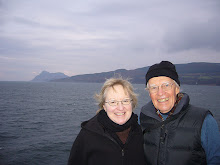In contrast to the United States, Scotland in general is very aware of the extent of poverty in both city and countryside. With a long history of providing for the general welfare, here there is a stated determination to develop programs that leave no one behind -- and narrow the yawning gap between rich and poor.
In 1999, when the Scottish government gained partial independence from England, it nobly resolved to focus its full attention on the evils of poverty with the ultimate goal of ending poverty. It embraced the UK anti-poverty goals targeting children, young people, families, older people and then communities. The eradication of child poverty was an explicit UK goal with a success date set for 2020 when childhood poverty would be defeated and injustice successfully wiped out. Progress would be realistically assessed at milestones along the way, citing both successes and failures. A new government report is just now being released.
Facing the hard reality that between 1999 and 2003 not much progress had been made, the initial "Social Justice" program was replaced with a program called "Closing the Opportunity Gap" that focued on far fewer issues. Even with a change of government in 2007, the public, private and voluntary sectors of the Scottish society remain determined to tackle poverty. There is always the danger of losing zeal for the cause, but generally the determination has held firm.
Since 1999, there have been many studies of the day-to-day experience of people living in poverty and this vital information has been passed on to the policy makers. Research studies that include listening to people in poverty have proved very revealing and have in some cases resulted in refining the goals of the various anti-poverty programs.
The problem is that even with this surfeit of hearings, studies and programs in which poor people relate their story, there are very few poor people at the table when decisions are made. Policy decisions continue to be made without the active participation and the passion of those most affected. Top-down decision-making, rather than bottom-up.
There are many reasons why poor people should have a major voice at the policy-making level. Most obviously, solutions should be tailored to the real problems. Consider this: some of the high-rise dwellings with dozens of subsidized apartments concentrated in one building may indeed be a breeding ground for social problems; the decision to raze many of them is well founded. Yet, the residents tell me that they do not want to move. They want to continue to live in these apartments among their friends rather than be scattered in new public housing around the city. I'm not aware that this conflict-of-interest is being ironed out in the halls where policy is being made. Top-down decision-making leaves poor people disempowered, disillusioned and suspicious of government.
Furthermore, poor people, who have the most to gain, bring a zeal to the anti-poverty movement that is unmatced by the dedication of professionals. It may be harsh to say, but the truth is that some professionals have a vested interest in the continuation of poverty.
After the hurricane Katrina devastated the Lower Ninth Ward in New Orleans, the residents loudly proclaimed, "Nothing about us without us is for us." The same is true for poor people everywhere. Personally, I don't want decisons being made about me without me being part of the process.
We sometimes hear the complaint that poor people are not really capable of considering social policy on a country-wide basis. And it is true that people unrehearsed in formulating systemic development projects don't always know the language or are shy to speak up. Yet when people are taken seriously they find their voice and their wisdom emerges. One of the consequences and curses of poverty is that self-image and self-esteem are low. As a poor people's movement to end poverty develops, people gain confidence.
When impoverished people are not heard, the society as a whole is denied a major resource that would help immeasurably in advancing the goal of ending poverty. The words of Dr. Martin Luther King, Jr., spoken when he launched the Poor People's Campaign just forty years ago, have important meaning for the country of Scotland today. "There are millions of poor people in this country who have very little, or even nothing, to lose. If they can be helped to take action together, they will do so with a freedom and a power that will be a new and unsettling force in our complacent national life..." (Martin Luther King, Jr., Trumpet of Conscience,1967
It's wonderful to be in a country that is not totally complacent and that faces its injustice and inequities and seeks to overcome them. But with poor people in leadership roles, the possibility of success will be greatly enhanced.
Wednesday, February 6, 2008
Subscribe to:
Post Comments (Atom)

No comments:
Post a Comment